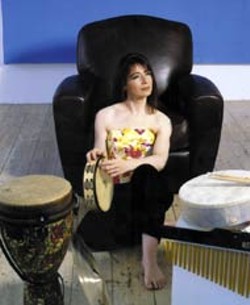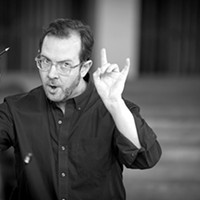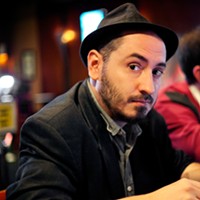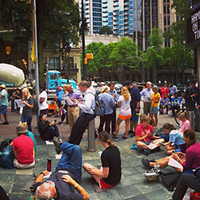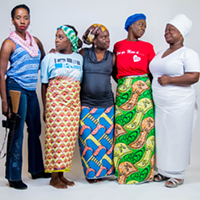She has recorded with artists as diverse as Leonard Slatkin, Bela Fleck, and Björk. She's trailblazed new frontiers in the repertoire of concert percussion pieces, adapting old classics to her vast arsenal of instruments and attracting a battalion of contemporary composers who have tailored new music to her unique abilities.
This week, Glennie makes her Charlotte Symphony debut at Belk Theater. She'll play her reworking of Vivaldi's Piccolo Concerto for marimba, embarking afterwards on Joseph Schwantner's Concerto for Percussion. This contemporary romp will send Glennie scurrying across the stage to make music, clanging and gonging and charming as only she can.
We conducted our transoceanic interview with Glennie last week via email. The differences between American and British spelling have been retained for your edification and delight.
CL: You've been outspoken in your criticism of stuffy orchestral protocol, particularly musicians who warm up and practice their parts in front of the audience. Have those comments caused any friction with musicians or conductors?
Evelyn Glennie: To date there have been no direct complaints. We often get the union line thrown at us such as, "They (the musicians) have a contractual right to practise for 'x' amount of time prior to performance." I believe that it looks scruffy and ragged seeing so many people (there can be over 100 people in a symphony orchestra) wandering around on the stage prior to the event.
At this time, particularly with withering audiences and widespread disinterest in concert music, there must be a concerted effort made by everyone to clean up their acts and realise that the "Gentleman's Club" atmosphere of orchestral playing has long since died. This is now a business and the audiences are our customers. . . the whole experience must be a more positive one for the audiences from the moment they walk through the door or pick up the phone to book their tickets.
We can all see for ourselves how you manage to play melody — but perhaps you can explain how you manage to hear it. Are you perhaps fortunate, even advantaged, to be working in the sometimes painfully deafening environment of a classical orchestra?
I am not an audiologist. If you want to know how someone hears something, then ask a qualified doctor or physicist. Please refer to the "Hearing Essay" on my website for more information, www.evelyn.co.uk. I am a musician and, like you, I hear through my entire body. I am a sound creator, therefore it is my job to explore and be involved in the extremities of sound. It is painful only if you decide that that is the case. We all have a choice in how we view things, and personally I want to be exposed to the full extremities of sound which is forever changing around us.
Who are your heroes among composers of classical music? What do you find special about their music?
J S Bach — he is THE most versatile and timeless composer who cannot be categorized due to the versatility of his music. One simply cannot categorize it. Stravinsky is also a favourite due to his raw complexity. It seems so grounded and organic.
Do you have heroes among jazz, rock, or rap musicians?
I am keen on many sorts of musical genres. I do not categorize music because I do not hear it in a way that defines "categories." Feeling and hearing means the same to me — sound is sound in its infinite forms and therefore my curiosity does not want to be hindered by categories. I look for "musical colour" when I do listen — which is seldom. Originality is another big plus.
What have you been doing lately from an exploratory or creative standpoint? Your next CD — what and when?
I continue to explore the colours and diversity of composers from around the world. I go on after Charlotte to LA, where I give the USA premiere of the Percussion Concerto by a young Dutch composer, Marijn Simons. He is also writing a double concerto for me for violin and percussion. Shortly afterwards I give the Canadian premiere of Bright Sheng's Marimba Concerto in Vancouver. I'm collaborating on an extensive project involving children and adult choirs with percussion, which will be premiered in Russia. I also give the Russian premiere of a double concerto for piano and percussion by John Psathas, which is a fabulous piece. The Margaret Brouwer Percussion Concerto is due to be released (hopefully) this year although I have no firm date. I shall also be premiering a concerto by Kevin Puts soon. As a company I am developing EG images (photography and production) and EG Jewellery (which is self-explanatory) which has been a passion of mine since I was a little girl.
Speaking of Arts_performance.html
-

Sailing With Hamlet
Jul 20, 2005 -
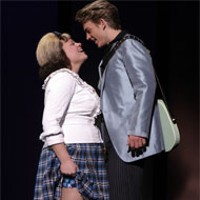
Proud To Be Plump
Jul 6, 2005 -
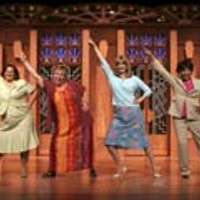
Putting The Sell In Cellulite
Jun 29, 2005 - More »
Latest in Performing Arts
More by Perry Tannenbaum
Calendar
-

NEW WINDOW GALLERY-Pat Rhea-ACRYLIC PAINTINGS-April 05-30 2024 VALDESE, NC 28690 @ New Window Gallery/Play It Again Records
- Through April 30, 12 p.m.
-
Derek Hough - Symphony Of Dance @ Ovens Auditorium
-

"Blood Residue Analysis of Paleoamerican Stone Tools in the Carolinas" @ Native American Studies Center
- Fri., April 26, 12-1 p.m.
-

ARTS RENAISSANCE, a GALA supporting the ARTS in South Carolina @ the Columbia Museum of ART
-
 The Piano Guys @ Ovens Auditorium
The Piano Guys @ Ovens Auditorium

